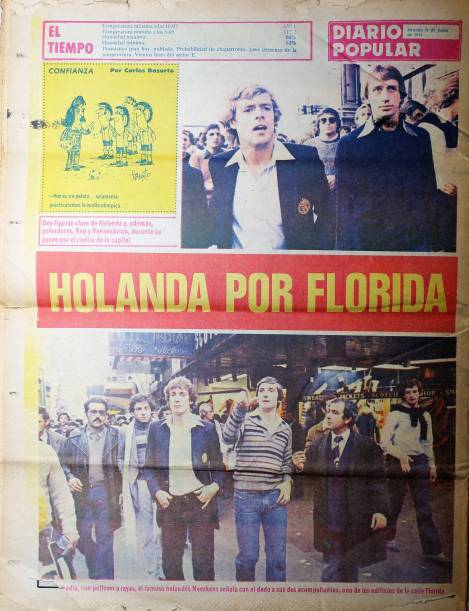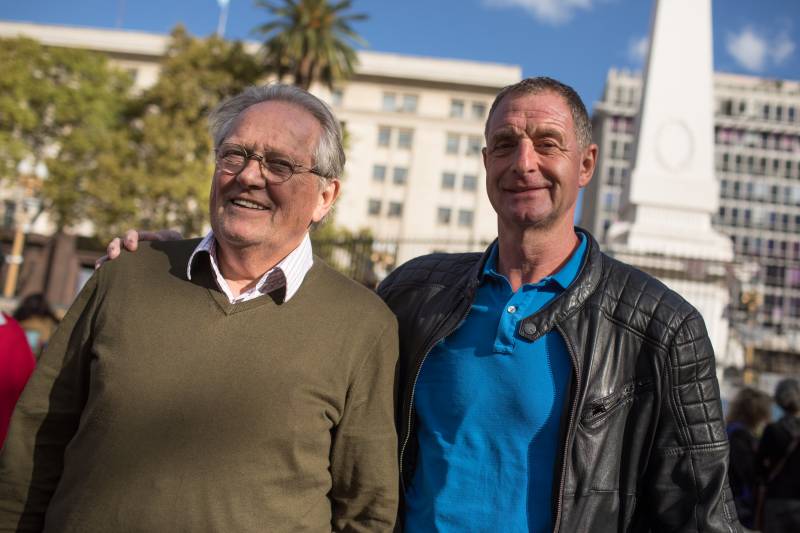It was the almost unstoppable power of the goals of Arie Haan and Ernie Brandts that put the Dutch team in the final with Argentina, but unfortunately they didn´t score in the match of June 25, 1978. It has been 40 years since that game. Haan is neither the 29 years boy nor Brandts the 21 years kid, but they returned to Argentina. They visited the memorial site that operates in what was the most emblematic clandestine detention center, torture and extermination of the last dictatorship, the School of Mechanics of the Navy (ESMA); a couple of blocks from the Monumental stadium, where they celebrated the goals against Italy and where they dreamed of changing the history of the 1974 final.

In their story about the World Cup there are points in common with the discourse of Argentine players. When they try to forge the world of politics and the world of football, there is a date that inevitably unites them again: June 25, 1978, the day of the final. “Before that day, we only played football, but when we played against Argentina, there was a discussion about what was happening, what we should do and how we should act” says Haan.
What to do?
We knew something about what was happening because some guys who did politics told us. At that time I said: “I am 21 years old, I am a football player and I want to play the World Cup”. It's true, you listened to things, but you didn´t see it with your own eyes, so for me there was no reason not to come to the championship” says Brandts.
“In the Netherlands there was a great deal so that the team didn´t come because of the disappeared” says Haan. “We thought that if we didn´t come, it wouldn´t change anything. Instead, it could make a difference if we came. Our players went to Plaza de Mayo, all the press was here and could talk about what was happening. Anyway, it was better to be here, even if they were using us. We were also using the situation. I think it was good to come so that the world would know what was happening” he says.
Neither Haan nor Brandts approached Plaza de Mayo, where dozens of Mothers met every Thursday to claim for their disappeared children. The Dutch press did accompany them. There was also a man wearing a Holland team shirt and a cross on his chest who came to the Plaza on Thursday, June 22 to give a flower to every Mother. But both say that there was a player who left the concentration to see the relatives of the disappeared: Wim Rijsbergen, a 26 years old defender who played the first three games of the Cup before being injured.
“We weren’t allowed to leave the hotel” says Brandts. "Only one player on our team saw the Mothers," he adds. "He left the hotel and told us".
 Arie Haan y Ernie Brandts en Plaza de Mayo. Foto: Joaquín Salguero
.
Arie Haan y Ernie Brandts en Plaza de Mayo. Foto: Joaquín Salguero
.
Despite the debate over the safety of foreign teams that preceded the World Cup, neither Brandts nor Haan were afraid while they were in Argentina.
What did shock them was to meet in the finals with the World Cup host, with the team that represented the country subject of the most terrifying denunciations of human rights violations.
–What do we do if we win? Do we hold the cup or not? No, we did not receive the cup– reconstruct Haan the debate inside the orange team.
Who raised the dilemma? According to Haan, it was Ruud Krol himself, the Dutch national team captain. “He said: 'I'm not going to look for the Cup'. Nobody argued. We didn´t go for the runner-up medal either” he adds. Nor did they go to the dinner of honor with which the dictator Videla intended to entertain them.
40 years
If he could go back in time, Brandts says he would not play the World Cup again in the Argentina of the concentration camps, the disappeared, the dead and the stolen babies. “If I knew everything, no” he says firmly.
Haan grabs his head and says: “1978, my God, many things happened while we played football, but 40 years passed”. Meters from one of the entrances of the clandestine center, he adds: “It's like going back to the past”.